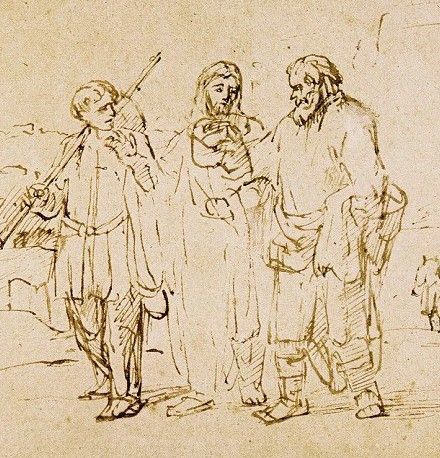 As the season of Easter continues, we hear more and more stories about the followers of Jesus and how they came to trust in the good news of his resurrection. Over the past two Sundays we have heard about Mary Magdalene, who recognizes Jesus when he calls out her name; and about Thomas, who believes when he finally gets a chance to touch Jesus’ hands, and his side.
As the season of Easter continues, we hear more and more stories about the followers of Jesus and how they came to trust in the good news of his resurrection. Over the past two Sundays we have heard about Mary Magdalene, who recognizes Jesus when he calls out her name; and about Thomas, who believes when he finally gets a chance to touch Jesus’ hands, and his side.
Nobody seems to get it right, right away, this news of Jesus’ rising. They need a lot of convincing. These folks are still dealing with grief and disappointment. And let’s be honest, resurrection is a hard thing to believe in. The unfamiliar disciples we meet in today’s story are no exception to this pattern. Cleopas and his companion have heard the report of the women at the tomb, but they don’t trust it. They’re still deeply hurt by all that has happened, utterly unconvinced that this story with Jesus might have a happy ending. They begin to walk from Jerusalem to the town of Emmaus, a journey of seven miles, puzzling it all over.
Somewhere along the way these two disciples encounter Jesus himself, the risen Christ; but they don’t recognize him. Still, they travel with this stranger for quite a while. They tell him their story, and he interprets the scriptures for them. Finally, as evening draws near, Cleopas and his companion urge this wise stranger to stay and eat with them. And Jesus takes the bread, blesses and breaks it, and gives it to them; and suddenly their eyes are opened. They recognize him. Jesus is made known to them in the breaking of the bread.
I am fond of this story, maybe because it seems more possible for all of us than many of the others we hear in this season. None of us were there to visit the tomb on that first Easter Day to see that it was empty. We can’t hear Jesus call us, like Mary did, or touch his side, as Thomas did – at least not in any earthly way. It would be a great mystical feat for us, by and large, very average Christians; something not to hold your breath for.
These others stories are compelling, but here, in the Emmaus story, I see something I can more easily recognize from our everyday life together. We, like Cleopas and his companion, have taken a great deal of time to puzzle together over the tragedy and hope of Jesus’ life, death, and resurrection. And we have something else in common with them, too. We do, at least occasionally, suspend our very wise conversations to seek God in less wordy ways. We, too, have come to know Jesus in the breaking of the bread. We have received from each other’s hands food for both body and spirit.
What do you think happens in this second part of the story, after all the discourse is done; these few verses where somehow, everything important is revealed in the meal? What gifts have you received by breaking bread with family, or friends, or strangers; or here, in this congregation, in fellowship or in the practice of communion? What can we learn in the breaking of the bread?
God, whether we are mystics or skeptics, wise beyond words or just beginning to learn about you, we are grateful that you come to meet us in the breaking of the bread. Thank you for seeking us out in the company of friends and strangers, in crunchy crusts and soft crumbs, in salty and sweet tastes, in loaves blessed and broken and shared together in your name. Keep feeding us, God; for we are still hungry. Amen.
~Hannah